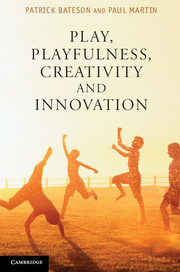Book contents
- Frontmatter
- Contents
- Advance praise
- Preface
- Acknowledgements
- 1 Introduction
- 2 The biology of play
- 3 The functions of play
- 4 Evolution and play
- 5 Creativity in humans
- 6 Animals finding novel solutions
- 7 People and organisations
- 8 Childhood play and creativity
- 9 Humour and playfulness
- 10 Dreams, drugs and creativity
- 11 Pulling the threads together
- Notes
- References
- Index
8 - Childhood play and creativity
Published online by Cambridge University Press: 05 July 2013
- Frontmatter
- Contents
- Advance praise
- Preface
- Acknowledgements
- 1 Introduction
- 2 The biology of play
- 3 The functions of play
- 4 Evolution and play
- 5 Creativity in humans
- 6 Animals finding novel solutions
- 7 People and organisations
- 8 Childhood play and creativity
- 9 Humour and playfulness
- 10 Dreams, drugs and creativity
- 11 Pulling the threads together
- Notes
- References
- Index
Summary
Even the most cursory glance at humanity reveals the enormous importance of each person’s experience, upbringing and culture. Take the astonishing variation among humans in language, dietary habits, mating customs, child-care practices, clothing, religion, architecture, art, and much else besides. Nobody could seriously doubt the remarkable human capacity for learning from personal experience and learning from others. Many of the differences between people derive from what happened to them when they were young. It would be very surprising, therefore, if play in childhood had no effect on adult behaviour. The question that is central to the theme of this book is this: does play in childhood enhance creativity in later life? Governments of all stripes recognise the need for innovation in order to produce prosperity. Scientists and engineers similarly understand the need for creative and innovative thinkers in their profession. We argue in this chapter that play and playfulness in childhood are potentially important in making adults more creative. Play comes in many forms, particularly in children, so we consider whether some types of play are more important than others in affecting subsequent creativity. We also touch on the role of playfulness in education.
The belief that play is an important part of how children acquire knowledge has been extraordinarily influential in educational circles in Britain and North America. Peter Smith (2010) commented that many researchers in this field had gone too far in assuming that play was essential for normal development and that playing was the best, or only, way of acquiring essential skills and experience. Such scepticism about the significance of play has not removed concern on the part of others that apparent restrictions on aspects of children’s play in the developed world could have unfortunate and unintended consequences for their development. We return to this issue later in the chapter.
- Type
- Chapter
- Information
- Play, Playfulness, Creativity and Innovation , pp. 89 - 102Publisher: Cambridge University PressPrint publication year: 2013



